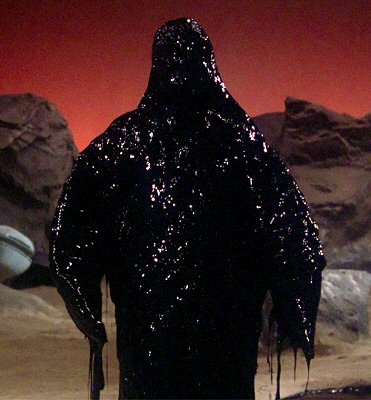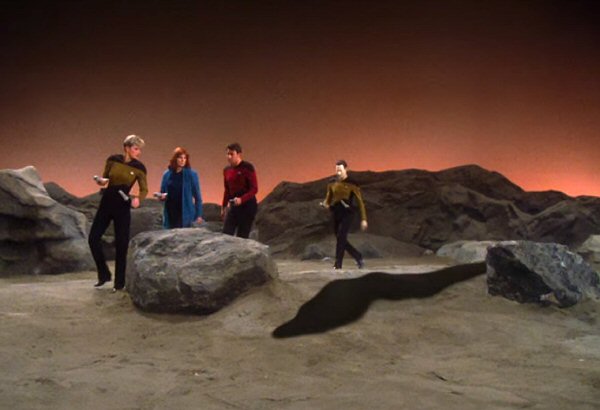The Star Trek episode « Skin of Evil » is used to explore the Jungian concepts of persona identification, inflation, shadow projection and the concept of scapegoating according to Erich Neumann. The dialogues echo active imagination. The need to integrate the shadow is clearly shown.

French version of this article
This article is based on Jungian analyst Erich Neumann’s book Depth psychology and a New Ethic (1949).
In the previous article Star Trek’s Borg: symbol for the collective unconscious in its devouring and annihilating shadow aspect an introduction was given to what Erich Neumann meant when he wrote about the Old Ethic. It is a way to maintain an ethical standpoint by eliminating anything that conflicts with our highest values. In addition, the concepts of suppression, repression, persona, shadow, and possession were explored.
Persona identification
Neumann writes:
“The situation which is more common and more familiar to the average man is that in which the ego identifies itself with the ethical values. This identification takes place by means of an identification of the ego with the persona. The ego confuses itself with the façade personality (which is of course in reality only that part of the personality that is tailored to fit the collective), and forgets that it possesses aspects which run counter to the persona. (p. 40)
Inflation
“In the process, the ego falls a victim to a very dangerous inflation – that is to say, to a condition in which consciousness is “puffed” up owing to the influence of an unconscious content.” (p. 41)
When we start believing that who we really are is the same as the idealized mask we show the world, our ego becomes identified with our persona. Because the persona consists of collective values, we call this an inflation. We are inflated or possessed when we are identified with the transpersonal or unconscious contents of our psyche.
“What makes this state of possession so dangerous … is that it prevents the ego and the conscious mind from achieving a genuine orientation to reality.” (p. 42)
In our consciousness there is no space for the repressed contents that are incompatible with our values, so they go underground in the unconscious and lead an autonomous life as shadow. As we are effectively cut off from certain parts of ourselves, we can no longer see what’s real. Our view of reality is limited.
This happens on the personal level as well as on the collective level. When we are born, we come into a family, culture and society, each with their own sense of values and corresponding collective shadow already firmly in place.
It takes enormous effort and energy to even imagine moving beyond the bounds of a system which has been in place for so long and by which we have been formed since and even before birth.
From our narrow point of view there is no denying that the Borg in Star Trek represent pure evil (previous article). Our ego, when identified with our persona, completely disavows that there could be any part of us that resembles some part of the Borg. No good resides in the Borg.
But, as unconscious shadow and thus largely autonomous, the Borg unwaveringly believe that they are working towards the greater good. To illustrate this point, I offer some quotes from the Borg Queen.
“By assimilating other races into our collective, we are bringing them closer to perfection.”
“They left behind their trivial, selfish lives, and they’ve been reborn with a greater purpose. We’ve delivered them from chaos into order.”
And a quote from a former drone:
“When we were linked, we had no ethnic conflict. There was no crime, no hunger, no health problems. We lived as one harmonious family.”
Active imagination
Active imagination is a method rediscovered and developed by Carl Jung. It consists of giving voice and representation to the different parts of our unconscious and then consciously dialoguing with them. Jung’s Red Book contains detailed descriptions and artwork of his own personal journey into his unconscious at a difficult time in his life.
Such accounts of active imagination show that these parts of us, represented by inner figures, are absolutely convinced that they are helping us. Like the Borg, they are single-minded and self-righteous and have absolutely no idea of the damage they can do to our outer life. They are autonomous and unconscious.
From the Borg’s point of view
We could turn it around and look at the Borg as the ones who are inflated and identified with their own persona or adaptation to their highest values: perfection, order and harmony. In the process of disowning and repressing the parts of them that are incompatible with that perfection, they have pushed individuality and freedom into their own shadow.
This is portrayed in the Star Trek: Voyager episodes called « Unimatrix Zero ». The Borg Queen discovers a mutation in the Borg Collective that affects one in a million drones. While these drones regenerate (the equivalent of sleeping) they experience their individuality and can interact with each other in a virtual environment full of trees. Upon waking to outer life on their spaceship, a Borg cube completely devoid of nature, they remember nothing.
Just as our shadow and other unconscious aspects come out in our dreams while sleeping in order to compensate for our one-sided conscious orientation, so do those of the Borg. Of course the Borg Queen sets out to eliminate this malfunction so that her Collective can once again be the epitome of perfection.
So, if we consider both the Borg and Star Trek’s United Federation of Planets as warring civilizations, we could say that both make the same mistake. By leading a one-sided life based on the elimination of anything that is incompatible with their highest values (Neumann’s Old Ethic), they each push their shadow parts onto the other party, who is then compelled to live them out in an unconscious and autonomous way.
One might interject by saying that this is not a fair comparison. The Borg’s attacks are unprovoked and threaten to annihilate what’s most precious to us: our individuality. No negotiation or compromise is possible. As they say: “Resistance is futile”.
In contrast, the Federation is happy to leave the Borg as they are, as long as they don’t try to infringe on another species’ freedom. But that last caveat actually does limit the accepted way of life of the Borg: reproduction and growth by assimilation of other species.
The Borg is not evil according to its own values, since freedom, individuality, and its corollaries of negotiation and compromise, are simply not part of those values.
On the other hand, the Federation values all life and every individual, so its actions are actually contrary to the growth and proliferation of the Borg. So which civilization is the more moral according to its own values?
Shadow projection and scapegoating
Neumann writes:
“The shadow, which is in conflict with the acknowledged values, cannot be accepted as a negative part of one’s own psyche and is therefore projected – that is, it is transferred to the outside world and experienced as an outside object. It is combated, punished, and exterminated as the alien out there instead of being dealt with as one’s own inner problem.” (p. 50)
The predatory Borg, who realistically do threaten the way of life of every other species, lend themselves perfectly to the shadow projection of the highly individualistic Federation. Psychologically it must feel like such a relief to the Federation that they can simply disown the parts that are incompatible with their values. They can be moral and good and be the heroes who fight the Borg who willingly live out those rejected negative parts.
But it is not always that easy to find the perfect carrier of the collective shadow. Sometimes the shadow projection is more arbitrary, and a scapegoat must be found or even created.
In the Star Trek: The Next Generation’s episode called “Skin of evil” a shuttle crashes on an uninhabited planet. When the crew of the Enterprise beams down they encounter “a black slick”. Although the word shadow is never used, the still image below clearly evokes this idea.

When the shadow insists on knowing why they want to get to the shuttle, Commander Riker responds that they need to attend to injured crew and that “preserving life, all life, is very important to us. Because we believe that everything in the universe has a right to exist.” It is one of the Federation’s highest values.
The shadow responds: “An interesting notion which I do not share.” When Lieutenant Yar, a member of the main crew, tries to step across it, the shadow kills her in a brutal and senseless act that nobody saw coming.
Meanwhile, the ship’s psychologist Counsellor Deanna Troi is hurt and stuck in the shuttle. She is half human, half Betazoid, and has the ability to sense other being’s emotions. Through her dialogue with the shadow, we learn its origin.
Troi: “You sound so alone. Abandoned. Who deserted you?”
Shadow: “Creatures whose beauty now dazzles all who see them. They would not exist without me.”
Troi: “You were together.”
Shadow: “They perfected a means of bringing to the surface all that was evil and negative within… erupting, spreading, connecting. In time it formed a second skin – dank and vile.”
Troi: “You.”
Shadow: “Yes.”
Troi: “They discarded you and left.”
Shadow: “And here I am.”
In true form to her empathic persona Troi responds: “You have my pity”. But this only angers the shadow further and makes it even more dangerous. Eventually the crew find a way to trick the shadow into lowering its guard and simply escape, leaving the shadow behind.
In this case there is no redemption because the shadow is not theirs and is completely cut off from its original owner and creator.
The fictional creatures whose beauty now dazzles all who see them succeeded in doing what no society could ever do in the outer, non-fictional world. They pushed or projected all of their characteristics that were not in tune with their values onto a second skin, and then succeeded in eliminating it, abandoning it, and cutting off their connection to it forever.
In reality we can never discard our shadow. This is true for people and their personal shadow as well as for civilisations and their collective shadow.
Neumann writes:
“A group which is psychologically split by being consciously identified with ethical values and at the same time unconscious of its shadow will display, in addition to unconscious feelings of guilt, a psychological sense of insecurity which is a compensation for the self-righteousness of its conscious attitude.
Repression will have to be continually on the defensive against a dawning apperception of the shadow side, since the unconscious reinforcement of the shadow will make it increasingly difficult for the ego and the conscious mind not to become aware of its existence at some point in the process.” (p. 56)
The more we repress the incompatible parts of ourselves, the stronger our shadow side becomes, and the more difficult it is to maintain the split and the illusion that we are one hundred percent good.
No matter how much we persecute, discard, and even kill our designated scapegoat, we cannot eliminate the shadow in the long-term for the simple fact that it is part of ourselves.
So what can we do instead?
The answer is that we must somehow heal the split and integrate our shadow.
The next article explores Neumann’s ideas on the New Ethic through the lens of Star Trek: Picard.
October 2023

Peggy Vermeesch, PhD
Peggy Vermeesch is a Jungian-oriented counsellor in private practice, who works via zoom in English, French, and Dutch. She teaches English for psychologists at the University of Western Brittany, and is a former researcher in geophysics at Imperial College London and the Universities of Texas and Southampton.
She publishes articles in French and English, and acts as Bilingual Content Editor for Jungian Psychology Space (JPS) and its Francophone mother site Espace Francophone Jungien (EFJ). She is also the author of the book Making informed decisions on childbirth: One scientist’s international perspective, published under the pseudonym of Sofie Vantiers.
For more information, see her webpage.
Articles
- Holding the tension of the erotic transference: embodying Captain Picard in Star Trek’s « The Perfect Mate »
- Erich Neumann’s New Ethic – Shadow and Evil in Star Trek:
- Narcissism in fairy tales such as Mary’s Child, Snow White and others:
- Toni Wolff’s structural forms of the feminine psyche
- The need to acknowledge the archetypal forces within
Interviews
For a list of articles and interviews published in French, visit Peggy Vermeesch’s page on EFJ.
